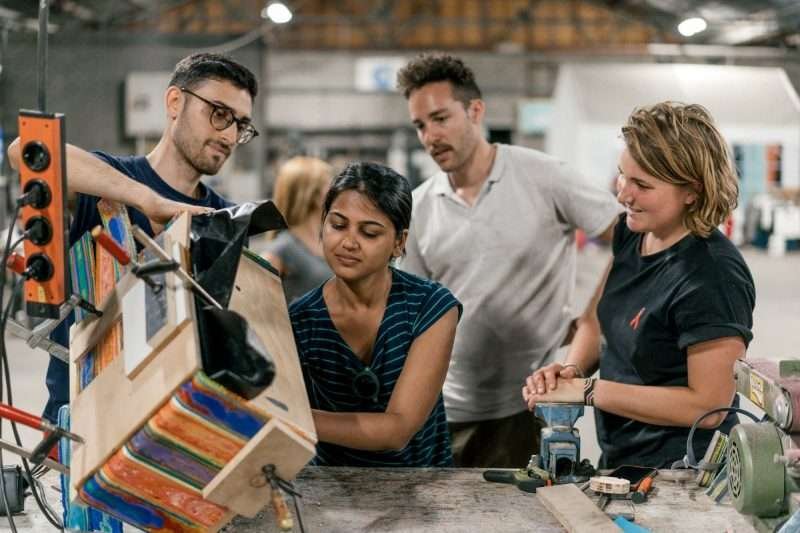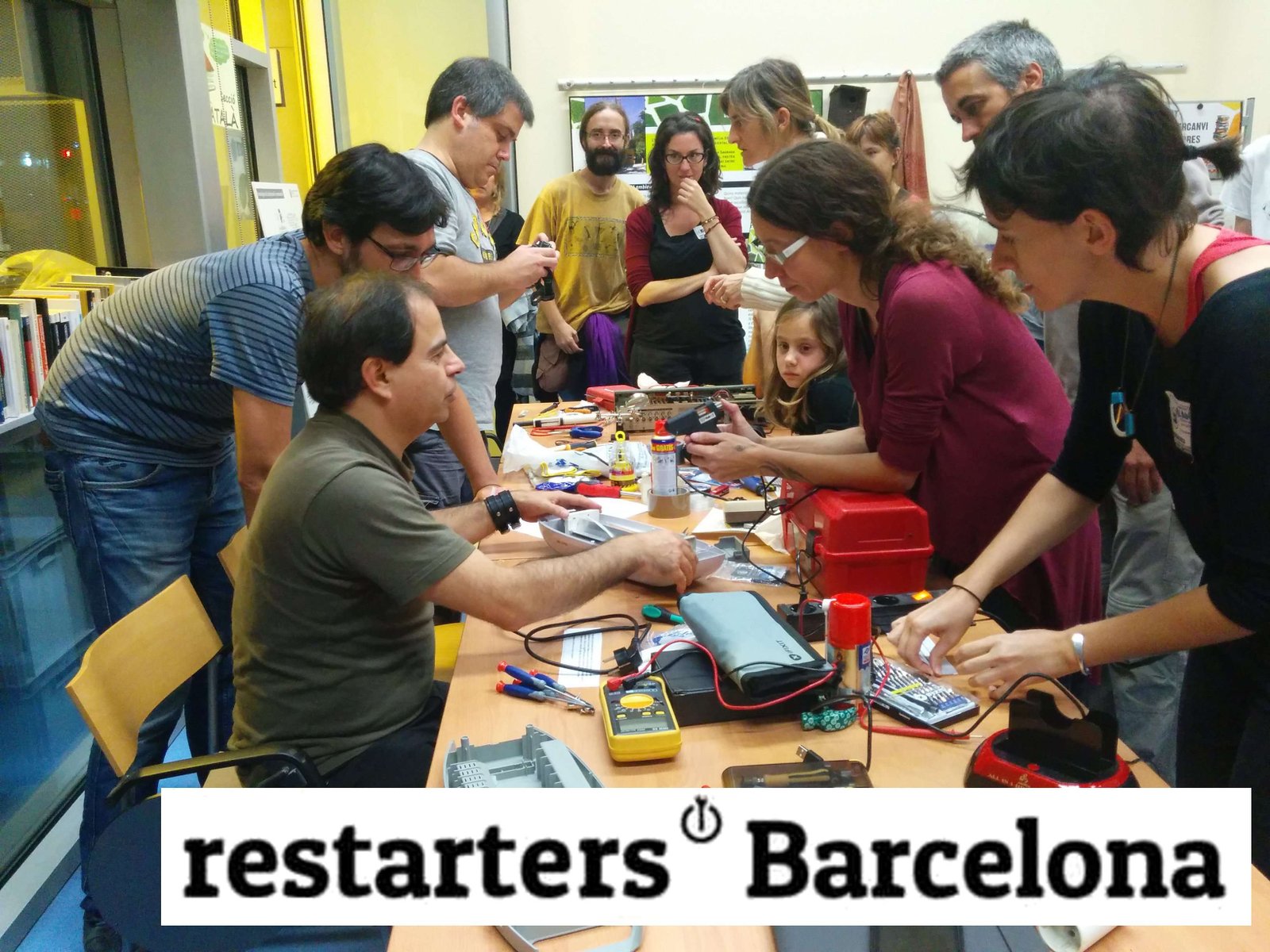Scarce natural resources, climate emergency, makers and the circular economy
Organized by Sonar + D, Fablab Barcelona, SokoTech and Make with the collaboration of the Barcelona City Council, Arrow, HP and PRUSA Research
Maker Faire 2019 emphasizes the urgent need to rethink and activate the transition towards a new circular economy model that extends the life of existing products beyond the planned obsolescence; reduce dependence on new raw materials; design with environmental criteria; minimize and recover waste and reduce CO2 emissions, thus overcoming the current unfeasible pattern of “extract, produce, use and throw away”.
Engineers, artists, designers, hackers, craftsmen, scientists and technologists at Maker Faire present their most advanced projects in the framework of the digital society, with the circular economy as the central axis of the meeting.

The program is made up of more than a hundred proposals, including stands, exhibitions, demos, documentaries, workshops and conferences. They include some of the most stimulating circular initiatives in the textile and fashion industries, as well as the agriculture and food sectors. Participants are experimenting and producing items with all types of waste or plastics that were collected in the Mediterranean in order to return to the market through the circular economy.
All this is complemented by the presentation of projects that offer advanced results in the areas of artificial intelligence, the internet of things, 3D manufacturing, nanotechnology, social robotics, chemistry, machine learning, photonics, levitation acoustics or cyborg practices, where prostheses are exo-senses and bodies fields of invention.
The Speakers Corner
The Speakers Corner program includes a long list of local and international experts.
Among them, Ernesto Oroza - Cuban artist, designer and writer who analyzes how, in the context of technical and material precariousness in Cuba since the 1990s, active and experimental relationships with objects are established through practices such as repair, reuse and refunctionalization of his pieces, which challenge the logic of current production and consumption; Marie Louise Gørvild, executive director and founding member of Techfestival, a new meeting of opinion leaders who explore the social aspects of technological progress, and Ezio Manzini, probably the leading expert in sustainable design today.
New this year is the inclusion of a documentary program on circular economy, with pieces such as Closing the Loop, Out of plastics or Molta Merda, which review the harmful effects of our linear economy while showing us solutions for a social economic transition
This sixth edition is celebrated on October 5 and 6 at the Nau Bostik, the first Museum of Urban Art in Barcelona, a unique space located in the Sagrera, for the creation and dissemination of culture.
Access is free and its program is aimed at all ages.

Barcelona, September 10, 2019
In the last 40 years, the global use of finite raw materials has almost tripled, from 26.7 million tons in 1970 to 84.4 million in 2015 and a recent Circle Economy report indicates that by 2050, if nothing remedies, the waste could reach 170/184 million tons, figures that deplete the sustainable limits of the planet.
This debauchery generates, in turn, unprecedented amounts of waste. As raw materials decrease and waste increases, the “extract, produce, use and throw away” model causes great pressure on the natural environment on which humanity depends, which requires urgent rethinking.
The Circularity Gap Report 2019, published by Circle Economy in Davos during the annual meeting of the World Economic Forum, emphasized that the world can maximize the possibilities of avoiding the dangerous climatic emergency by moving from a linear economy to a circular economy, and thus be able to meet the emission reduction commitments assumed by 195 countries in the Paris COP 21 Agreement to limit global warming to 1.5 °C.
Circularity in Cities
A circular and resilient economy describes a new economic system where nature and people are studied as a single set. This is based on reduction, reuse, recycling, repair and recovery of materials, as well as conscious manufacturing processes of local and clean products.
Cities, where more than half of the world's population lives today, are ideal environments, laboratories to understand how to design and scale sustainability through resilience and circularity, possibly the two most important properties for the future of people.
The transition to a circular economy means rethinking all aspects of urban life. This includes research, solutions and consumption habits, so that raw materials and products remain in circulation beyond the programmed useful life, as well as minimize the loss of finite resources offered by the planet and the emission of gases from greenhouse effect.
The increasing availability of low-cost tools and technologies, digital distribution, research, local manufacturing and a new circular economic logic, which lies at the heart of the Maker culture, mark a decisive change for a society dependent on production linear and centralized.
Maker Faire Barcelona
The Maker Faire brings together the local and international maker community annually, understanding this community as a broad universe that unites researchers and practitioners of the Maker movement, universities and research centers and socially innovative companies.
The meeting between makers, technologists, scientists and companies aims to promote the interaction between different initiatives and a great diversity of proposals. As a fundamental objective, it is intended to provide feedback between the projects and the different participants.
With this, we want, on the one hand, to promote the integration of academic and business science and technology into a rapidly growing innovation ecosystem such as the Maker movement; on the other, we want to facilitate the meeting between the best researchers and creators of the three systems and, in turn, favor the transmission of knowledge, practice and awareness among the general public.
Maker Faire
Maker Faire is the annual event of invention and digital creativity applied to addressing and solving the great challenges of a progressively complex society.
It brings together thousands of engineers, artists, designers, hackers, artisans, programmers, scientists, "handyman" or, simply, curious of any age, training or background with the desire to create and implement solutions to real problems.
Local and international Makers share and expand all their knowledge and creativity while presenting brilliant projects through exhibitions, creative technology workshops, interactive conversations and demonstrations aimed at all ages.
The Maker Movement
The Maker movement is an open innovation ecosystem that uses new technologies to revolutionize the way of making use of natural resources and production, blurring, in turn, the boundaries between creation and consumption.
The movement emphasizes learning through experience. Its standard is the DIY concept (Do It Yourself), it promotes global knowledge and local production of physical objects in open collaboration, DIWO (Do It With Others).
The Makers investigate and implement new solutions, transfer the innovations to the market with the idea of promoting self-sufficient and sustainable societies and creating relevant employment opportunities for its citizens. They invent, share, inspire and motivate and, in this process, they are transforming education, the economy and society.
Barcelona and the Maker Movement
Since 2007, Barcelona has hosted the first Fab Lab of the European Union, a world reference in the Fab Lab Network which, in collaboration with the Fab Foundation and the MIT's Center for Bits and Atoms, coordinates global programs such as Academany, Fab Academy or the Fab City project .
Years later it will be launched in Can Valldaura, in the Collserola Natural Park, and also in collaboration with MIT, the first European laboratory of technologies for self-reliance that develops academic projects and programs in association with the main research centers of the world.
In 2014 Barcelona was the headquarters of the International Conference (FAB10), and since 2014 the city has a public municipal network of digital manufacturing with cutting-edge technologies and digital literacy, learning and training programs aimed at all citizens.
In recent months, the Parc Tecnològic de Barcelona Activa in Nou Barris is the headquarters of a new manufacturing athenaeum that combines general and business use that wants to strengthen the economic fabric of proximity as well as promote scientific and technological vocations.
The City Council also promotes the Maker District in Poble Nou, a pilot project of digital social innovation that wants to boost the processes of reindustrialization of the urban fabric with elements of high added value such as the use of advanced technologies for local production or professional training, and which is part of the Maker movement and the global network of Fab Labs.



Thank you for reading and sharing stories of art & creativity on FrikiFish! This platform is an ad-free, one-woman labor of love, providing free promotion services to artists and creative projects in Barcelona. If this content enriches your life in any way, please consider supporting me with a donation on Paypal or you can buy me a coffee. Thank you!